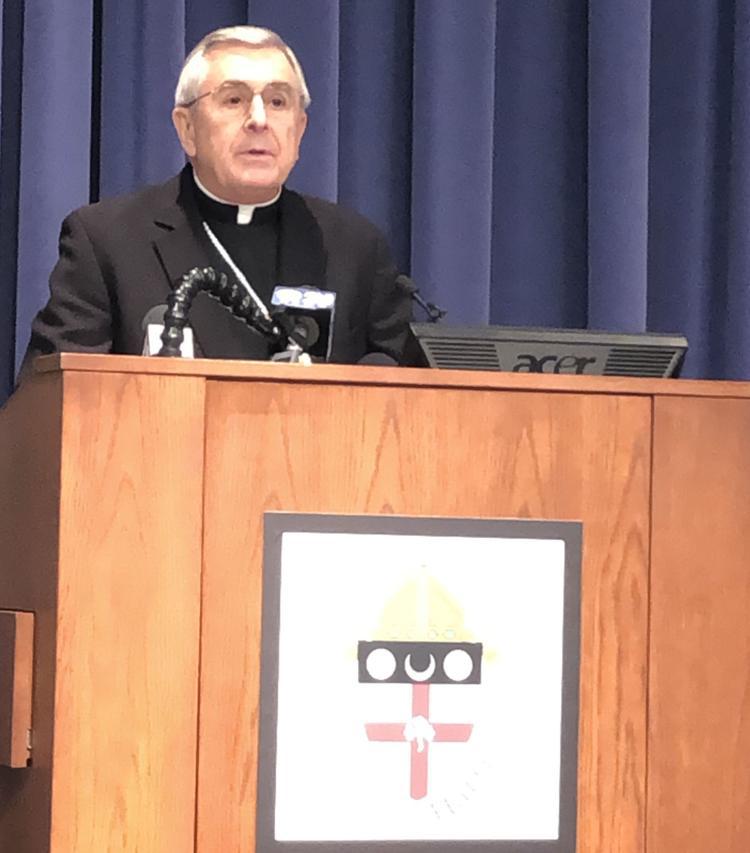|
Victims expect more dioceses to declare bankruptcy
By John Finnerty
Adult survivors of priest abuse across Pennsylvania expect that other dioceses will follow the Roman Catholic Diocese of Harrisburg and declare bankruptcy to force victims tons seek damages through bankruptcy court rather than civil court. Mary McHale, a Reading women involved with the Survivors Network of those Abused by Priests said "I think it’s only a matter of time” before other dioceses in Pennsylvania declare bankruptcy, a move announced by the Harrisburg diocese in mid-February. “It’s not a shock,” she said. “It’s another play in their playbook.” McHale was abused by a priest in Reading, who began grooming her after she disclosed to him that she was gay. She only came forward after another woman publicly accused the same priest of abuse. Reading is in the Allentown Catholic Diocese, which, like Harrisburg offered a compensation fund for victims. McHale said she refused to seek compensation through the fund because she knows other Catholics sometimes claim that abuse survivors are driven by financial interest. At least 20 Catholic dioceses across the country have filed for bankruptcy protection. The Harrisburg Diocese was the first to do so in Pennsylvania. Bishop Lawrence Persico in the Erie Diocese said there are no plans for that diocese to declare bankruptcy. Attorneys for the Pittsburgh Diocese have said in court that that diocese could end up in bankruptcy. A spokesman for the Scranton Diocese didn’t respond to a request for comment on that diocese’s position on possible bankruptcy. Matt Haverstick, an attorney for the Harrisburg Diocese, said after the bankruptcy announcement that the diocese's move was spurred, in part, by court decisions that could allow more victims to sue. McHale, who was abused by a priest in Reading, said that survivors of priest abuse keep in touch with each on social media and based on the conversations there, she thinks most survivors expect that there will be more dioceses’ declaring bankruptcy. Tim Lennon, SNAP’s national president, said that bankruptcies have clear downsides for victims. Most noticeably, they allow the church to retain too much control over how victims are treated, he said. The bankruptcy process also eliminates the possibility that suing could force church officials to acknowledge their actions publicly, he said. “It let’s the bishops off the hook for responsibility of decades long coverup of hundreds of child rapists and sexual abusers,” Lennon said. McHale said that while most survivors view compensation as only a part of the justice they want, the bankruptcy process largely makes compensation the only thing available to them. “It’s another example of how the church always holds all the cards,” she said. The Harrisburg diocese has already paid out almost $13 million to 111 victims of child sexual abuse, but at the Harrisburg Diocese announcement, attorneys said church officials believe there may be another 200 victims who could seek compensation through the bankruptcy proceeding. The diocese told the court it has estimated its potential liabilities between $50 million and $100 million, with assets of less than $10 million. It listed creditors that include a $30 million loan from the Pennsylvania Economic Development Financing Authority and 12 blacked-out names that were represented by lawyers. All survivors of priest abuse in the Harrisburg Diocese are encouraged to submit a claim from the fund created as part of the bankruptcy process can do so by calling (866) 977-0992 or by visiting https://dm.epiq11.com/case/rcdh/info, said Rachel Bryson, a spokeswoman with the Harrisburg Diocese. Based on the church’s estimates in their legal filings that there are about 200 potential victims and $100 million in potential liability, the diocese is estimating that the average compensation per victim through the bankruptcy would be no more than an average of $500,000 per victim. A civil trial would provide a public venue to disclose the wrongdoing of church leaders. There would be no similarly transparent opportunity provided in bankruptcy proceedings. And if a case goes through civil court, lawyers will have the chance to use discovery rules to gain additional access to the church’s secret archives to reveal the extent of the cover-up and who was involved, he said. At the Feb. 19 announcement, Haverstick, the diocese's attorney, said the bankruptcy proceeding is the fairest path forward because it will allow the church to continue to operate and do charitable works while also providing a mechanism to compensate victims. “It’s the most responsible thing we can do for victims and survivors and to the people who are supported by diocesan charities and for all the faithful in this diocese,” Haverstick said. Contact: jfinnerty@cnhi.com
|
.
Any original material on these pages is copyright © BishopAccountability.org 2004. Reproduce freely with attribution.
